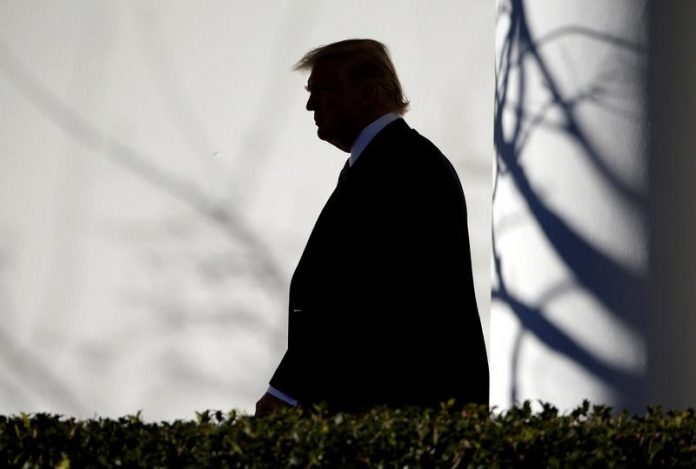WASHINGTON (Reuters) – U.S. President Donald Trump’s executive order calling for a military plan to defeat Islamic State, expected in the coming week, is likely to see the Pentagon revisiting options for a more aggressive use of firepower and American troops.
But U.S. officials, who spoke on condition of anonymity, doubt the country’s military will advocate fundamentally changing a key strategy refined during the Obama administration: relying on local forces to do most of the fighting, and dying, in Syria and Iraq.
In a briefing with reporters on Saturday, a senior administration official said Trump would soon sign the executive order asking the joint chiefs of staff to give him a plan in 30 days for defeating Islamic State, fulfilling a campaign trail pledge.
Trump made defeating Islamic State – which has claimed responsibility for several attacks on American soil and is frustrating U.S. military operations across the Middle East – one of the key themes in his campaign. But he avoided talking about specifics of any plan to combat the radical group.
Any shifts by the U.S. military would have broad repercussions for U.S. relationships across the Middle East, which were strained by former President Barack Obama’s effort throughout his administration to limit U.S. military involvement in Iraq and Syria.
Trump’s Defense Secretary James Mattis has advocated a more forceful approach against Islamic State, but how he will pursue that remains unclear.
U.S. military officials have long acknowledged the United States could more quickly defeat Islamic State by using its own forces, instead of local fighters, on the battlefield.
But victory, many U.S. military officials have argued, would come at the expense of more U.S. lives lost and ultimately do little to create a lasting solution to conflicts fueled by bitter ethnic, religious and political divides in nations with fierce anti-American sentiment.
David Barno, a retired lieutenant general who once led U.S. forces in Afghanistan, said it would be a major escalation if Trump’s administration opted to rely on U.S. troops by putting them into a direct combat role and effectively substitute them for local forces.
“We’ve been down that road, and I don’t think the American people are excited about that idea,” said Barno, who now teaches at American University in Washington, D.C.
Experts said the Pentagon could still request additional forces, beyond the less than 6,000 American troops deployed to both Iraq and Syria today, helping the U.S. military to go further and do more in the fight.
But they also said the Pentagon may focus on smaller-scale options like increasing the number of attack helicopters and air strikes as well as bringing in more artillery. The military may also seek more authority to make battlefield decisions.
Obama’s administration found itself for years battling accusations of micromanaging the wars in Iraq, Syria and Afghanistan.
“I do think the Pentagon will argue for, and get a lot more authority, to put advisers and special operators closer into the fight,” Barno said.
RAQQA RAMP-UP
Trump, who pledged in his inaugural address to eradicate Islamic State and like-minded groups “from the face of the earth,” met military chiefs at the Pentagon for about an hour on Friday.
A U.S. defense official, speaking to reporters after the talks, said they discussed ways to accelerate the defeat of Islamic State, among other hot-button issues, including the threat from North Korea, but offered no details.
“The chiefs did most of the talking,” the official said.
In Syria, the big step for the U.S.-backed forces will be finally taking control of the Islamic State’s de facto capital of Raqqa.
In his Senate confirmation hearing, Mattis said he believed the United States already had a strategy that would allow the American military to regain control of Raqqa. But he said that strategy needed to be reviewed and “perhaps energized on a more aggressive timeline.”
One key decision awaiting the Trump administration is whether to directly provide weapons to Kurdish fighters in Syria as they push toward Raqqa, despite fierce objections from NATO ally Turkey.
The United States views the Kurdish fighters as its most reliable ally in Syria but Ankara sees them as an extension of Kurdish militants who have waged a three-decade insurgency on Turkish soil.
The Syrian Democratic Forces (SDF), which include the Kurdish fighters, launched a multi-stage operation in Raqqa province in November aimed ultimately at capturing the city from Islamic State.
Across the border in Iraq, local forces backed by U.S.-led coalition airstrikes and advisers on the ground have secured a major part of Islamic State’s Iraqi stronghold of Mosul.
Still, U.S. military leaders warn Islamic State will likely morph into a more classic insurgency once it loses Raqqa and Mosul, meaning the fight could stretch on for years.
(Reporting by Phil Stewart; editing by Yara Bayoumy and Bill Rigby)

